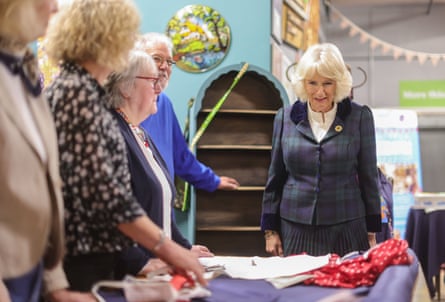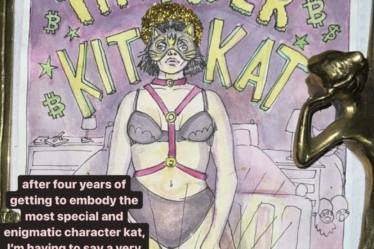
Name: Charity shops.
Age: One of the earliest known was opened by the Wolverhampton Society for the Blind in 1899.
Appearance: Regal treasure troves.
Are you sure? The last charity shop I went into was full of VHS tapes and dead men’s shoes. How dare you. Charity shops are where the ruling elite buy their furniture.
The ruling elite don’t buy their furniture, they inherit it. And if they did buy it, they wouldn’t go to a charity shop. Oh yeah? What about the Queen?
What about the Queen? God rest her soul. Not that queen; the new one – Camilla, the Queen Consort.
I will never, ever get used to that, but carry on. She buys her furniture from charity shops.
Says who? Says she. On a visit to a south-London boutique run by the charity Emmaus UK – of which she is a patron – the queen consort said: “All the furniture is so useful; I’ve picked up some nice pieces.”
Like what? White leatherette recliners? CD shelves? Formica wall units with the doors on backwards? Don’t be such a snob. Charity shops aren’t like that any more.
I’m sorry, but yes they are. Not if you’ve got a good eye and you know where to look.
OK – where do I look? Certain outlets have a reputation for good stuff – the Salvation Army shop in Hackney, for example, is a favourite among fashion insiders.
Maybe the charity shops of London are full of oligarchs’ castoffs, but the reality elsewhere is very different. The Shelter shop in Glasgow sometimes has donations from the BBC costume department, and Age UK in Guisborough, North Yorkshire, is meant to be worth a visit – in an article last year, Glamour magazine mentioned a “secret” vintage room.
I guess buying from charity shops is pretty sustainable. Exactly – instead of buying new cheap flatpack furniture, you can buy old cheap flatpack furniture that was put together by some other idiot in the late 90s.
Now who’s being a snob? You’re right. There are some real finds to be had out there: classic fashion, vintage furniture and antique books.
You mean I can give a pittance to charity then make a fortune selling my finds on eBay? Charities have largely wised up to that kind of thing. Oxfam – the largest secondhand bookseller in the UK – takes expert advice to get its valuations right.
And if I just want a giant stuffed Pikachu with tea stains on it? I’m sure you can find that, too.
Do say: “One’s got one’s eye on those stacking wicker occasional tables.”
Don’t say: “How much for the mug with one’s face on it?”



